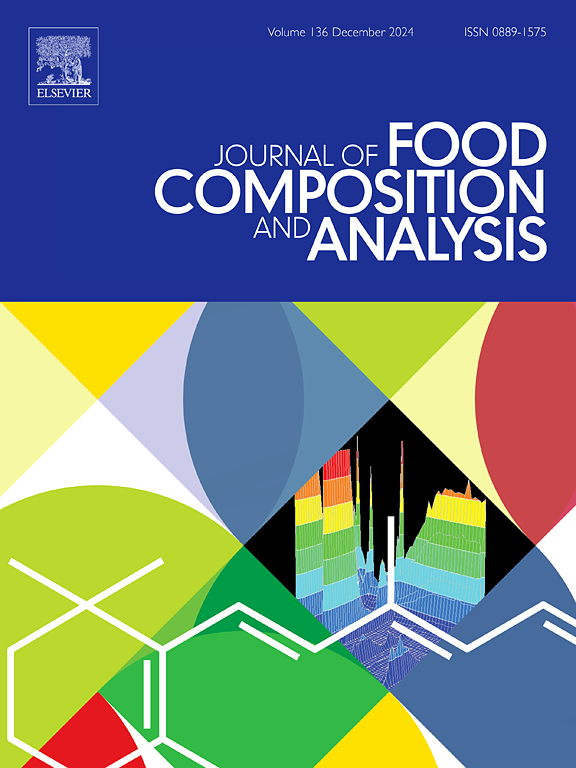用于辣椒辣椒素含量估算的近红外光谱预测模型:用于特异性种质筛选的快速挖掘工具
IF 4
2区 农林科学
Q2 CHEMISTRY, APPLIED
引用次数: 0
摘要
辣椒是一种广泛生产的作物,其辣椒素含量是一项重要的经济特征,具有很高的价值。估算辣椒素的传统湿化学方法费时费力,而近红外光谱等非破坏性方法与化学计量学相结合,提供了高效的替代方法,简化并加速了生化评估。本研究首次开发并验证了基于近红外光谱的辣椒素含量预测模型,并使用 MPLS 回归法测试了该模型在印度辣椒种质中的适用性。研究人员进行了多种数学处理,并根据外部验证集中较高的 RSQexternal 值、RPD 值和较低的 SEP 值选出了最合适的模型,这表明该模型具有较高的预测准确性,误差极小。该模型在辣椒素含量方面的 RSQexternal 值高达 0.808,RPD 值达 2.088,SEP 值低达 3.415,显示出卓越的预测性能。配对样本 t 检验的 p 值为 0.757(p > 0.05),表明湿实验室值和预测值之间的差异不显著,从而证实了该模型的准确性。次年,该模型的适用性在新收获的种质上进行了验证,显示出更高的可靠性得分 0.949,进一步证实了模型的可靠性。该模型有助于对辣椒种质进行高通量、准确的辣椒素筛选,加快辣椒作物改良计划和高辣椒素新品种的开发。本文章由计算机程序翻译,如有差异,请以英文原文为准。
NIR spectroscopy prediction model for capsaicin content estimation in chilli: A rapid mining tool for trait-specific germplasm screening
Chilli is a widely produced crop, highly valued for its capsaicin content, a key economic trait. Traditional wet chemistry methods for estimating capsaicin are time-taking and laborious, while non-destructive methods like NIRS coupled with chemometrics, offer efficient alternatives, simplifying and accelerating biochemical assessments. This study is the first to develop and validate and tested for applicability of NIRS-based prediction model for capsaicin content in Indian chilli germplasm using MPLS regression. Various mathematical treatments were performed, and the most suited model was selected based on high RSQexternal, RPD and lower SEP values in the external validation set, indicating strong prediction accuracy and minimal error. The model achieved high RSQexternal value of 0.808, RPD value of 2.088 and low SEP value of 3.415 for capsaicin content, demonstrating excellent prediction performance. A paired sample t-test p-value of 0.757 (p > 0.05) showed non-significant difference between wet lab and predicted values, confirming the model’s accuracy. The applicability of the model was validated on fresh harvest germplasm the following year, showing a higher reliability score of 0.949, further confirming model’s reliability. This model would aid in high-throughput, accurate screening of chilli germplasm for capsaicin, accelerating chilli crop improvement programs and the development of new high-capsaicin varieties.
求助全文
通过发布文献求助,成功后即可免费获取论文全文。
去求助
来源期刊

Journal of Food Composition and Analysis
工程技术-食品科技
CiteScore
6.20
自引率
11.60%
发文量
601
审稿时长
53 days
期刊介绍:
The Journal of Food Composition and Analysis publishes manuscripts on scientific aspects of data on the chemical composition of human foods, with particular emphasis on actual data on composition of foods; analytical methods; studies on the manipulation, storage, distribution and use of food composition data; and studies on the statistics, use and distribution of such data and data systems. The Journal''s basis is nutrient composition, with increasing emphasis on bioactive non-nutrient and anti-nutrient components. Papers must provide sufficient description of the food samples, analytical methods, quality control procedures and statistical treatments of the data to permit the end users of the food composition data to evaluate the appropriateness of such data in their projects.
The Journal does not publish papers on: microbiological compounds; sensory quality; aromatics/volatiles in food and wine; essential oils; organoleptic characteristics of food; physical properties; or clinical papers and pharmacology-related papers.
 求助内容:
求助内容: 应助结果提醒方式:
应助结果提醒方式:


